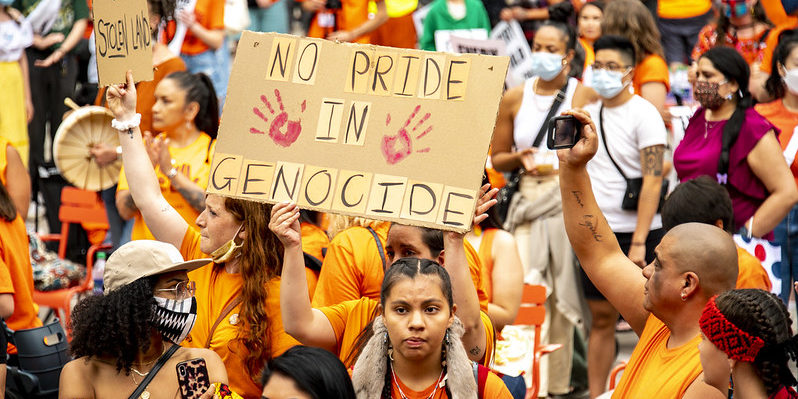WARNING: This story contains distressing details.
On May 23, 2021, Tk’emlups te Secwépemc First Nation announced the discovery of 215 unmarked graves on Indigenous children on the grounds of the former Kamloops Indian Residential School in Kamloops, B.C.
“The discovery of 215 bodies of children in a mass grave outside the Kamloops residential school catapulted Canadians from disbelief into the Indigenous realm of hard truth. It didn’t take long for other Indigenous bodies to be discovered in unmarked or long-forgotten graves that were alongside every residential school, confirming what Indigenous people have known to be true for decades,” said Rachel Snow in a column on the discoveries written last year. Snow is an Iyahe Nakoda educator, speaker, writer, and co-contact for Indigenous Activists Network.
The discovery in Kamloops confirmed what Indigenous peoples had been saying for years, that the residential school system in Canada was a form of genocide against their people.
Discoveries continue
The discovery at the Kamloops Indian Residential School came after an investigation by the Tk’emlups te Secwépemc First Nation using ground penetrating radar.
Just days after the discovery in Kamloops, 104 unmarked graves were discovered at the Brandon Indian Residential School in Brandon, Man.
At the end of June 2021, 751 more unmarked graves were found on the grounds of the Marieval Indian Residential School in Marieval, Sask.
By the end of the year, 1,413 unmarked graves of Indigenous children had been found on the grounds of former residential schools throughout Canada.
The investigations still continue. So far in 2022 unmarked graves of 330 Indigenous children have been found at residential school sites in Williams Lake, B.C., Kamsack, Sask., Fort Pelly, Sask., Grouard, Alta., and Punnichy, Sask.
In all, since 1974, various Indigenous historians and investigators have accounted for 2,098 Indigenous children who died while in the care of the residential school system.
Apology from the Vatican
Nearly a year after the discovery at the Kamloops Indian Residential School. Pope Francis, the head of the Catholic Church met with representatives of Canada’s Indigenous communities on April 1.
The Catholic Church played a key role in the operation of many of the residential schools in Canada.
“All this made me feel two things very strongly — indignation and shame,” Pope Francis said to an audience of 190 residential school survivors. “Indignation, because it is not right to accept evil, and even worse to grow accustomed to evil as if it were an inevitable part of the historical process. All these things are contrary to the gospel of Jesus Christ. For the deplorable conduct of these members of the Catholic Church — I ask for God’s forgiveness and I want to say to you with all my heart, I am very sorry.”
Reactions from Indigenous communities poured in following the apology, with Niigaan Sinclair perhaps best summarizing the response from many, saying in an April Nation to Nation interview on APTN that the apology is a good first step, but calling on four steps to follow:
“First, the church should pay the cash it was legally obligated to hand over under the Indian Residential Schools Settlement Agreement but didn’t. Then it should return the stolen land on which residential schools were built.
It should release any archival documents, relevant records and stolen Indigenous artifacts in its possession. And finally, there must be a massive probe to get abuse in the church under control.”
To mark the anniversary of the discovery, the Tḱemlúps te Secwépemc will be holding a ceremony on Monday, May 23 at Tḱemlúps te Secwépemc Pow Wow Arbor that will include a sunrise service at 5:30 a.m. followed by several cultural performances.
The Indian Residential School Survivor Society maintains a hotline for residential school survivors who are in crisis. The 24-hour a day crisis line can be reached at 1-800-721-0066.




